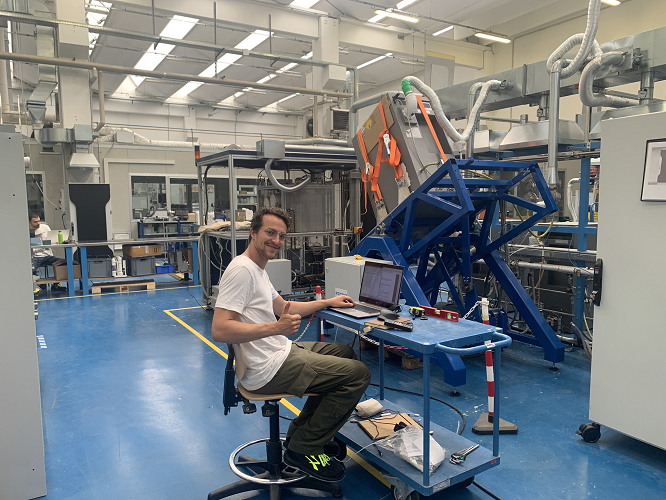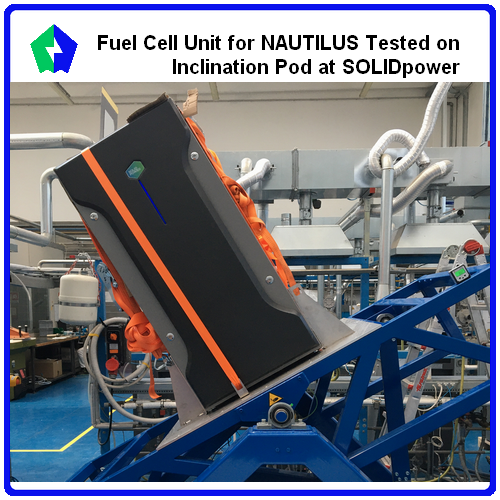Fuel cell power systems are clearly superior to combustion engines in terms of performance, economy and, not least, ecology. They are significantly more efficient in the utilization of the resources, suitable for usage with various fuels, cleaner in emissions and very quiet in operations. Therefore, are potentially great solution for replacement of internal combustion engines in marine transportation.
Compared to stationary application, fuel cells installed on-board are heavily affected by cruise ship movements. Within the NAUTILUS project the scope of research is focused on SOLIDpower fuel cell performance in inclinations and ship motions.
Before the acceptance of the fuel cell unit for on-board installation in the demonstrator, the fuel cell has been subject of strident tests of compliance with safety requirements for the design and construction of machinery, ambient operating conditions, inclinations of ship and vibrations of the propeller and engines.
In June 2022 this testing started at SOLIDpower premises in Italy. The BLUEGEN SOFC module delivered by SOLIDpower was subject of testing on the inclination pod - a testing equipment developed as a simulator of motions that ships are exposed.
Fuel cell power systems are clearly superior to combustion engines in terms of performance, economy and, not least, ecology. They are significantly more efficient in the utilization of the resources, suitable for usage with various fuels, cleaner in emissions and very quiet in operations. Therefore, are potentially great solution for replacement of internal combustion engines in marine transportation. Compared to stationary application, fuel cells installed on-board are heavily affected by cruise ship movements. Within the NAUTILUS project the scope of research is focused on SOLIDpower fuel cell performance in inclinations and ship motions.
Before the acceptance of the fuel cell unit for on-board installation in the demonstrator, the fuel cell has been subject of strident tests of compliance with safety requirements for the design and construction of machinery, ambient operating conditions, inclinations of ship and vibrations of the propeller and engines.
In June 2022 this testing started at SOLIDpower premises in Italy. The BLUEGEN SOFC module delivered by SOLIDpower was subject of testing on the inclination pod - a testing equipment developed as a simulator of motions that ships are exposed.

An exposure of the SOFC module to inclinations has an impact on components that include liquids, such as valves and pumps. Additionally, an inclined level has influence on the static pressure exerted internally in the unit on the dynamic pressure on the different components as well. For example, sloshing of liquids or a variation in the operational pressure of the fuel cell stack is bound to happen in maritime operation. Leaking of the stack can happen, as well as bending of some structural components, if the exerted stress level will be higher than the one that appears in a stationary condition.
After the of the inclination pod testing, a structural analysis defining the different loads and forces exerted on the SOLIDpower SOFC module will be elaborated by TUD and implications on the SOFC unit performance will be implemented into subsequent testing on the hexapod. This testing will be realized for three months and from its outcomes possibly some required modification of the module will be implemented. The final outcome of testing will be the test report summarizing the perspective acceptance of the fuel cell unit for future on-board installation.
This project has received funding from the European Union’s Horizon 2020 research and innovation program under grant agreement No 861647.
Stay in touch with us!
#NAUTILUS_2020 #propulsionsystem #sustainableshipping #battery #fuelcell #cruiseships
***
⇒ Follow us on Twitter/LinkedIn to be on board.
Follow #NAUTILUS_2020
NAUTILUS is a short for Nautical Integrated Hybrid Energy System for Long-haul Cruise Ships.

This project has received funding from the European Union’s Horizon 2020 research and innovation program under grant agreement No 861647.

